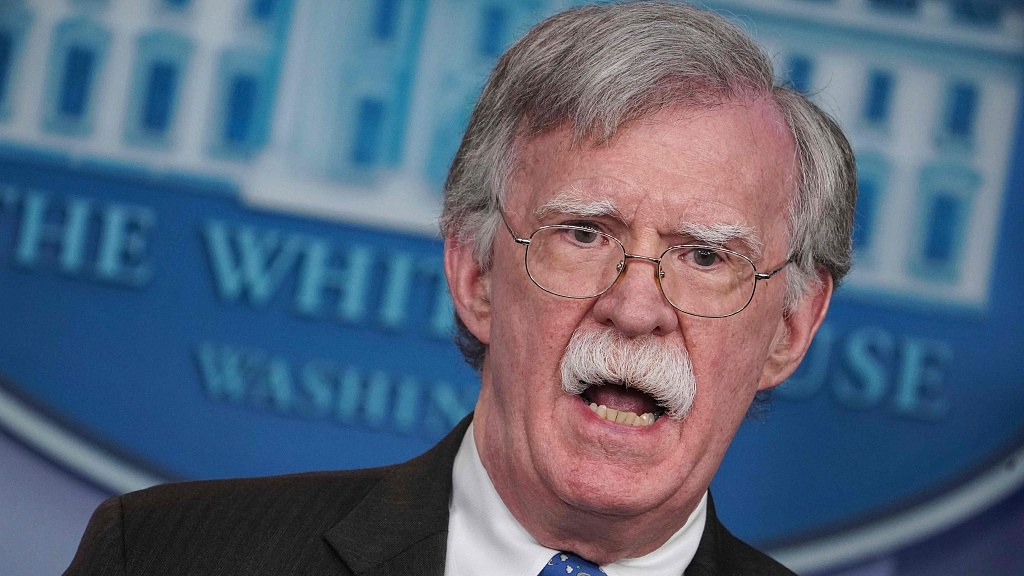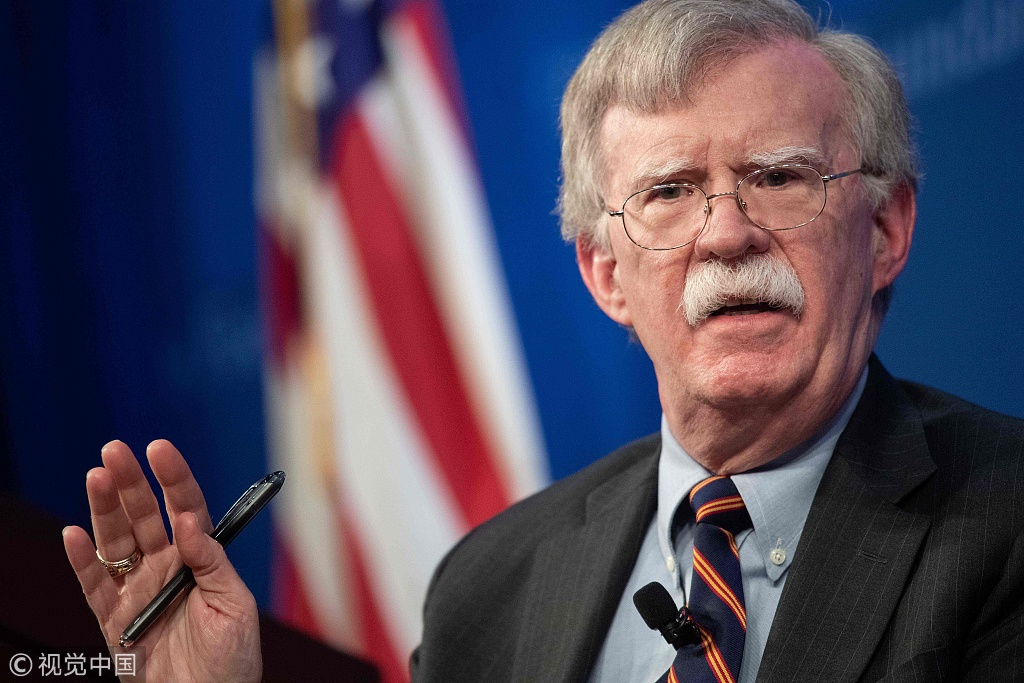
Opinion
18:22, 11-Mar-2019
Opinion: Is John Bolton taking control of America's DPRK policy?
Tom Fowdy

Editor's note: Tom Fowdy, who graduated from Oxford University's China Studies Program and majored in politics at the Durham University, writes about international relations focusing on China and the Democratic People's Republic of Korea. The article reflects the author's views, and not necessarily those of CGTN.
U.S. President Donald Trump met Democratic People's Republic of Korea (DPRK) leader Kim Jong Un in Hanoi, Vietnam on February 27. Unlike the optimistic forecasts, the summit failed to reach an agreement, puzzling some analysts.
And in the nearly two weeks since the meeting, one man has been receiving special attention from commentators: John Bolton, Trump's advisor on national security.
Since the failure to reach an agreement in Vietnam, Bolton has featured significantly in the media setting out America's position. His comments have included threats to ratchet up sanctions, but also a reassertion of what is described as the “maximalist” approach to denuclearisation. That is, the position that the DPRK should not just make partial concessions for sanctions relief to Washington, but that it should willingly surrender its entire nuclear program.

U.S. President Donald Trump (R) and DPRK leader Kim Jong Un hold a meeting during the second U.S.-DPRK summit at the Sofitel Legend Metropole hotel in Hanoi, February 28, 2019. /VCG Photo
U.S. President Donald Trump (R) and DPRK leader Kim Jong Un hold a meeting during the second U.S.-DPRK summit at the Sofitel Legend Metropole hotel in Hanoi, February 28, 2019. /VCG Photo
On this note, a recent conference saw Bolton state he gave Kim Jong Un a “list” in Hanoi, specified in both English and Korean, outlining America's specific definition for “final and fully verified denuclearisation” to the DPRK leader. What was alarming and surprising is that the list demanded not only DPRK's nuclear facilities and warheads, but also its entire stockpile of chemical, biological and other related weapons. In a nutshell, this consists of most of the country's conventional capabilities as to how they are known.
This has led to the figure of Bolton becoming somewhat of a bogeyman to U.S.-DPRK talks. He is being widely criticized across social media, even by centrist analysts. But just how much influence does he have over the president's position? And is he merely being used as a negotiating ploy to force more meaningful concessions from Pyongyang?
I believe it is the latter. Bolton is influential, but he is not decisive in determining policy. His presence and posture itself is a form of communication, a menacing demeanor if that. The president chose him for the very reason that he adds teeth and fear into negotiating strategies; hence both carrots and sticks are being presented by him here.
Why do so many people hate John Bolton? His role in the George W. Bush administration as ambassador to the United Nations saw him become infamous for his robust support of the war in Iraq in 2003. Bolton's actions revealed a foreign policy philosophy which is driven by pure realism, that is the belief that practical force and the threat of it thereof is the most effective means of securing power and influence in international affairs.
It is a school of thought which believes in the use of “necessary evil” and that morality is flexible and can sometimes be disregarded in order to attain the ultimate greater good. Indeed, such a philosophy in the context of the Bush administration has earned him the labels of “neoconservative” and “fanatic” – particularly as a result of his vocal support for the U.S.-led regime changes around the world.

U.S. National Security Adviser John Bolton speaks at the Heritage Foundation in Washington, DC, December 13, 2018. /VCG Photo
U.S. National Security Adviser John Bolton speaks at the Heritage Foundation in Washington, DC, December 13, 2018. /VCG Photo
So how did Bolton become a part of the Trump administration? The president's initial national security advisor, H.R McMaster, a U.S. Army General, frequently sparred with others in Trump's cabinet over disagreements on foreign policy. McMaster would be dismissed in 2018. Not long after, Bolton was appointed as his replacement, but why?
Trump is a brutal negotiator; he wants to be surrendered by like-minded brutal negotiators. Trump and his colleagues prefer using the full weight of American power to coerce allies and enemies alike, regardless of the consequences. It is an amoral foreign policy that finds little incentive in values and enjoys utilizing fear. Bolton ticked the boxes accordingly, someone who would be robustly “America first” in his solution for every issue.
But just how much influence does Bolton have in the administration's day to day foreign policy? He is accused of ruining the Hanoi summit by apparently pushing the U.S position back towards “maximalist” demands and shutting out more pragmatic diplomats such as Steven Biegun who preferred a “step-by-step” approach.
Still, it is not important to overstate his influence. The “maximalist” approach to the denuclearisation of the DPRK is not something conceived by him; indeed the policy line predated him by about a year. He may have been able to advise the president to stubbornly stick to that line or hold out for more, but he did not create nor does he dictate the policy or its merits; they exceed him as an individual. In addition, Trump is well known for ignoring, dismissing or overruling members of his administration as he sees fit.
Instead, the expanded usage of Bolton should be interpreted as a negotiating ploy to extract more from Pyongyang. His presence alone makes America's position seem more rigid, stubborn and less compromising as a whole. He is perceived as an asset in this regard, just as the president intended, hence this is why Bolton is not only carrying sticks, but carrots as well. He has said repeatedly that Trump would be happy to meet Kim again and offered an avenue forwards for talks.
Still, this breeds confidence in few. By attempting to up the ante against the DPRK and continuing to stick to unrealistic demands, many will accordingly and rightfully continue to note he is indeed derailing the process with an agenda to thwart any success. Just how far can you push it and how much can you insist on before Pyongyang stops listening? As is typical of Trump, it is an approach nose deep in risk.
(If you want to contribute and have specific expertise, please contact us at opinions@cgtn.com.)

SITEMAP
Copyright © 2018 CGTN. Beijing ICP prepared NO.16065310-3
Copyright © 2018 CGTN. Beijing ICP prepared NO.16065310-3